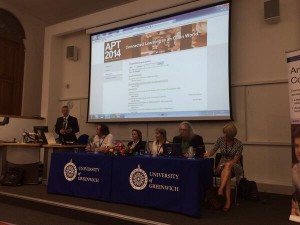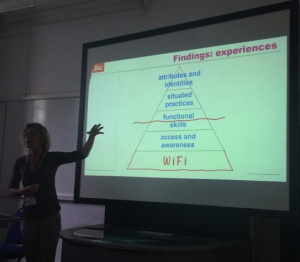The Academic Practice with Technology conference in Greenwich (8 July) was our last ‘specialist’ consultation event. Issues that came up in the twitter stream for the conference show just how relevant our work is to current practitioners: bring/build your own, the need to prepare students to study with technology, integration at the level of services, the affection students feel for ‘spaces and places’ of study, the ‘walled garden’ and is place in the open landscape. The welcome address from Greenwich VC David Maguire included reference to our project and to the earlier but still relevant Supporting Learners in a Digital Age, while Sarah concluded the day by discussing our work on a panel with Stephen Downes, Sheila MacNeil and others.

 Our workshop, ‘Today’s students, tomorrow’s challenges: digital experiences that connect‘, focused on the kind of digital experiences students might (should?) have in the curriculum. Participants heard about our key findings and current discussion points, then had a chance to review work in progress on our ‘digital experiences’ resource. As well as adding in a couple of new experiences, and a host of new examples, the workshop gave us some insights into how the resources might be used in practice.
Our workshop, ‘Today’s students, tomorrow’s challenges: digital experiences that connect‘, focused on the kind of digital experiences students might (should?) have in the curriculum. Participants heard about our key findings and current discussion points, then had a chance to review work in progress on our ‘digital experiences’ resource. As well as adding in a couple of new experiences, and a host of new examples, the workshop gave us some insights into how the resources might be used in practice.
Feedback included:
‘Most of us could think of examples – it’s nice to know that we are actually doing quite a lot of this already’
‘These suggestions are very proactive’
‘I do deliver a lot of these things already but I get resistance from students’
‘We already use a digital literacies model, but then we get to a point with staff where they ask what they can actually do to achieve the standard. These are the answers.’
Ideas for using the resources in practice included:
- In a card sort – things we do already, things we need to do better.
- In a variety of staff development activities – course review, initial and continuing professional development, drop-in sessions, even as a stand-alone reference.
- As subject specialist versions – but it is also useful to share across subject areas (so perhaps best to use the generic ideas but add subject-specialist examples, and to use only a selection with each subject area).
In the discussion that followed, several participants made the point that even very good ideas will fail to be taken up if there is no strategic investment in staff development. For staff to offer relevant digital experiences – and to innovate their practice beyond the given examples – they need time to develop their confidence and they need recognition for their investment. It was also observed that students can be conservative in their expectations of university study. As a result they may be unwilling to try new and challenging methods of learning. The whole institution has to be involved in preparing students to study effectively – with and without technology – so they can engage confidently with different approaches once enrolled on their course.
The conclusions:
Staff must have time to innovate, students must be primed for innovation
Workload models and the academic timetable must be flexible, as well as the digital environment.

